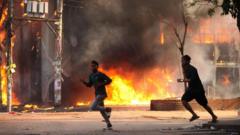A UN report has concluded that the violent crackdown on protesters by Bangladesh's previous government may constitute crimes against humanity. The investigation revealed that up to 1,400 people were killed, primarily by security forces, during a period of intense political unrest initiated by student-led protests.
UN Investigates Possible Crimes Against Humanity in Bangladesh Protest Crackdown

UN Investigates Possible Crimes Against Humanity in Bangladesh Protest Crackdown
Recent UN findings accuse Bangladesh's former government of employing systematic violence against protesters, suggesting potential crimes against humanity amid mass unrest.
The article text:
The United Nations has announced that the crackdown on protesters in Bangladesh by the former government may qualify as "crimes against humanity." According to a recent report, UN human rights investigators characterized the actions of Sheikh Hasina’s administration as a systematic and brutal response to widespread opposition, resulting in approximately 1,400 deaths, primarily at the hands of security personnel.
The unrest began with student protests against job quotas in civil service positions and escalated into nationwide demonstrations calling for the resignation of Hasina and her Awami League Party, which had been in power for 15 years. The situation reached a peak when Hasina fled to India just before protestors stormed her residence in August of the previous year. Police responses to these protests have been described as excessively violent, marking some of the worst state-led violence in Bangladesh since its independence in 1971.
UN human rights chief Volker Türk revealed in Geneva that there is credible evidence indicating that senior officials and political leaders within the past government directed attacks against anti-government demonstrators. The findings suggest that there was an official policy aimed at violently repressing dissent, including the documented shooting of protesters and a host of other human rights violations, such as arbitrary arrests, torture, and even the targeting of children, who composed an estimated 13% of the fatalities.
According to Türk, evidence implicates high-ranking officials in orchestrating a calculated campaign of state violence. The report referenced detailed accounts from over 230 interviews with victims and witnesses, and analyzed various forms of evidence including videos, medical records, and photographs.
While the former government claims significantly fewer total fatalities, with official estimates citing 834 deaths, the UN’s findings paint a starkly different picture. They underscore a pattern of extrajudicial killings, extensive arbitrary detentions, and torture occurring under the aegis of political leadership coordination.
In response to the alarming findings, Bangladesh’s current caretaker leader, Muhammad Yunus, has expressed his commitment to securing a peaceful and dignified environment for all citizens. Furthermore, the UN has called for investigations into violence emanating not only from government forces but also from retaliatory actions against former supporters of Hasina's administration and various religious and ethnic groups, emphasizing the necessity for accountability on all fronts.
The United Nations has announced that the crackdown on protesters in Bangladesh by the former government may qualify as "crimes against humanity." According to a recent report, UN human rights investigators characterized the actions of Sheikh Hasina’s administration as a systematic and brutal response to widespread opposition, resulting in approximately 1,400 deaths, primarily at the hands of security personnel.
The unrest began with student protests against job quotas in civil service positions and escalated into nationwide demonstrations calling for the resignation of Hasina and her Awami League Party, which had been in power for 15 years. The situation reached a peak when Hasina fled to India just before protestors stormed her residence in August of the previous year. Police responses to these protests have been described as excessively violent, marking some of the worst state-led violence in Bangladesh since its independence in 1971.
UN human rights chief Volker Türk revealed in Geneva that there is credible evidence indicating that senior officials and political leaders within the past government directed attacks against anti-government demonstrators. The findings suggest that there was an official policy aimed at violently repressing dissent, including the documented shooting of protesters and a host of other human rights violations, such as arbitrary arrests, torture, and even the targeting of children, who composed an estimated 13% of the fatalities.
According to Türk, evidence implicates high-ranking officials in orchestrating a calculated campaign of state violence. The report referenced detailed accounts from over 230 interviews with victims and witnesses, and analyzed various forms of evidence including videos, medical records, and photographs.
While the former government claims significantly fewer total fatalities, with official estimates citing 834 deaths, the UN’s findings paint a starkly different picture. They underscore a pattern of extrajudicial killings, extensive arbitrary detentions, and torture occurring under the aegis of political leadership coordination.
In response to the alarming findings, Bangladesh’s current caretaker leader, Muhammad Yunus, has expressed his commitment to securing a peaceful and dignified environment for all citizens. Furthermore, the UN has called for investigations into violence emanating not only from government forces but also from retaliatory actions against former supporters of Hasina's administration and various religious and ethnic groups, emphasizing the necessity for accountability on all fronts.





















